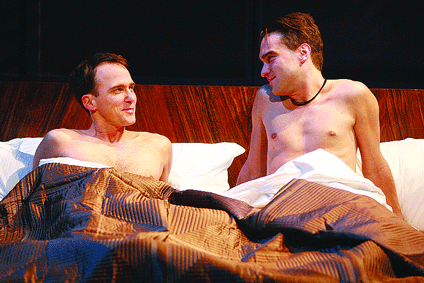Volume 5, Number 4 | Jan. 26 – Feb. 01, 2006
Theater
The Little Dog Laughed
Second Stage
307 W. 43rd St.
Tue. 7 p.m.; Wed.-Sat. 8 p.m.;
Wed, Sat 2 p.m.; Sun 3 p.m.
$42-$65; 212-246-4422
Glittering and Amoral
Douglas Carter Beane’s wickedly funny satire of truth
Memo to Douglas Carter Beane: Please write faster. We need your mordant wit and trenchant observation of human foibles and spiritual corruption more now than ever.
In a society where truth is being displaced for “essence” rather than literal fact, it’s evident we are in serious trouble. Effectively, “based on a true story” has become a suitable substitute for reality. As long as we are being entertained, we’ll gamely suspend any and all disbelief.
The unremittingly venal movie industry might seem far too predictable a foundation for an allegory on the corruption of the soul. Yet in Beane’s spectacular new play “The Little Dog Laughed,” it is the very pervasiveness of entertainment and the commonplace lust for celebrity infecting our culture that amplify the horror of the tale.
The play opens with a tribute to Holly Golightly, who in “Breakfast at Tiffany’s” made prostitution just another career choice, and spins into a rich and compelling tale of four contemporary people—an actor, an agent, a male prostitute, and his girlfriend—each of whom is whoring themselves out as though it was the most natural thing in the world to have no moral center. It’s not just that they have no moral center; it’s that having one is a risible liability faced with the reality of the world as it is.
Over two brisk acts, Beane delivers a stinging rebuke to the shallowness of our culture and one of the most wry and wickedly funny comedies of the year. The facility of his writing and the graceful economy of his character development never undermine the biting social commentary of the play, which gives the production a delightful richness that make it irresistible.
Mitchell (Neal Huff) is a fading, pretty boy movie star who is a closeted homosexual. He falls in love with Alex (Johnny Galecki), a callboy he books through a TV ad when drunk. Alex in the meantime falls in love with Mitchell, though he also has a relationship with Ellen (Zoe Lister-Jones), a party girl who has been seeing an older man because he’s rich. Diane (Julie White), Mitchell’s agent, is trying to orchestrate her client’s next big career move—appearing as a gay character in a major motion picture. But that won’t happen if Mitchell is known to be really gay. How each character comes to terms with what he or she will or will not do, to what level of prostitution they will sink—or rise as the case may be—is juxtaposed against some of the wittiest writing about Hollywood, the New York social scene, and personal relationships seen in a long time.
At the same time, Beane develops themes of loneliness, isolation, and that vague longing for something more that is the byproduct of selling out. As Diane says to Alex at the end, he’s the only one who can make a moral stand, which he does, because he knows what it’s like to struggle. Everyone else is soft and fighting to protect that ease—at all costs. It’s a searing indictment of cultural values, but delivered with charming wit and seen through Beane’s gimlet eye one could almost laugh it off. Almost––which is why this play works so brilliantly.
Scott Ellis has directed his wonderful company with an equal level of precision that keeps the energy fast and dazzling while raising the hair on the back of our necks. Johnny Galecki delivers a terrific performance. Simple, understated and confused at times, Alex is the only character who is honest about his motivations and so is the only character who has a potential for redemption. Neal Huff as Mitchell is a perfect combination of lust and vacuity that makes him the puppet of whomever is pulling the strings at any given time. Zoe Lister-Jones is divinely creepy as Ellen, the amoral party girl who values nothing but her own impulses. She has a level of self-absorption and self-reverence not seen since “The Devil Wears Prada.”
But it is Julie White who gives one of the most sophisticated, comic, and biting performances of the year. She is a woman so narrowly focused on her needs that she abandons her soul to the point where she can’t recall having one. As Diane extols the happy ending—she got what she wanted—her absolute blindness to the moral wasteland she’s helped create in the context of a happy image is nothing short of stunning.
The same can be said for the whole evening. Satire is never easy, but handled with such proficiency by all involved it can be sublime.
gaycitynews.com

































